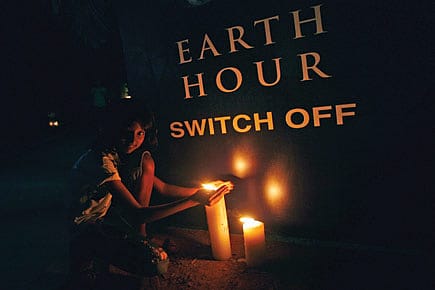Lights off… but Why?

We’re being told to save the world by switching off power for an hour, but, er, don’t most parts of India do this for hours every day anyway?
On 15 December, Indians can switch off their lights for one hour between 7.30 and 8.30 pm, and in one hour of one day assuage any guilt about hurting the planet. Since 2007, the organisers of Batti Bandh have been advocating the voluntary blackout as the best way to ‘raise awareness about the various crises Earth is facing today due to our ecologically wasteful lifestyle’. Plugged through social networking sites, email chains and other GenNext media, Batti Bandh is a feel-good campaign that began in Mumbai, but this year the organisers hope the whole country will switch off. Folks who don’t like the idea will be cajoled with fun promotional events, even initiatives sponsored by altruistic corporates like Tata and Hyundai.
To light up or not are luxurious options available only to the misguided organisers of Batti Bandh and their tiny audience. Most of their compatriots, even ones living an hour away from Mumbai, would be happy with even a few hours of uninterrupted service. Joslin Pereira, 28, would have made a fine spokeswoman for Batti Bandh. Pereira lives in Kharegaon, on the outskirts of Mumbai, which suffers up to eight hours of blackouts a day. In Kalwa, the nearest town, cuts fluctuate between six to 10 hours a day. The local power supplier has an innovative way to dodge complaints: keep the phone off the hook.
Openomics 2026: Continuity and Conviction
06 Feb 2026 - Vol 04 | Issue 57
The performance state at its peak
In those parts, blackouts are not pre-empted by campaigns and slogans, usually the lights just go off anywhere between 8.00 am till about 11.00 am and then again after 3.00 pm till about 6.00 pm. This happens to be the state of affairs of electricity in most parts of our country. People like Pereira, who are forced to switch off power eight hours daily, are also unintentionally doing good.
When Batti Bandh first took place in 2007, residents of Mumbai, living in one of the few places in the country that enjoy uninterrupted, expensive private power service, switched off their lights, LCD TVs and central ACs and enjoyed the romance of candles and sea breeze. According to the event organisers, that hour saved 178.5 MW of electricity in Mumbai alone. But do we really know the long-term impact of that one-hour of savings? It certainly wouldn’t have made any inroads into solving the power problems this country faces. After that one symbolic hour, Mumbai continued gobbling more than its fair share of resources because this city’s residents have financial and political weight that Pereira and her neighbours don’t have. Maybe the whole exercise would have been less ridiculous if that power had been diverted to places like Kharegaon. After all, switching off the electricity for an hour is not the most enlightening thing to do.
